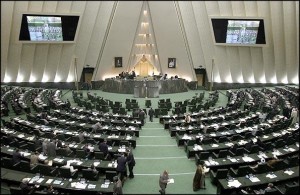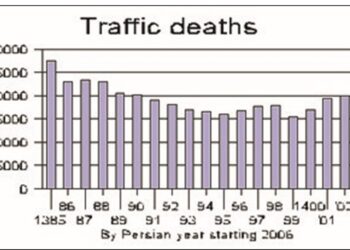February 14-2014

The Majlis approved President Rohani’s first budget Sunday with remarkable speed and minimal changes in a solid vote of confidence in the new administration.
Although the Majlis is controlled by conservatives who overwhelmingly supported candidates who challenged Rohani in last June’s elections, they largely lined up in support of his budget.
The best demonstration of that was the fact that the budget debate lasted a mere 10 days. The budget was approved Sunday, six weeks before Now Ruz. During the administrations of Presidents Rafsanjani and Khatami, the budget debates normally continued until just days before Now Ruz, when the new budget year begins.
(Under President Ahmadi-nejad, no budget was ever submitted on time in December and the Majlis finally stopped trying to finish the budget by Now Ruz, instead passing stop-gap budgets for the first few months of each year to give themselves time to tear apart and re-work Ahmadi-nejad’s budget for the rest of the year.)
In the end, the Majlis modestly increased Rohani’s budget by 1.3 percent. But that minimal addition was itself remarkable and showed an acceptance of Rohani’s austerity philosophy. Even with the additions made by the Majlis, the new budget will be an increase of less than 10 percent over the previous year’s budget. And given inflation now officially running at around 35 percent, that means a real reduction of about a quarter in government spending.
Under Ahmadi-nejad, the philosophy was to spend ever more vast sums in an effort to keep the economy moving. Rohani has called for budget discipline and the Majlis has swiftly lined up behind him.
The approved budget totals 7.93 quadrillion rials, an increase of 100 billion rials from the 7.83-quadrillion-rial budget Rohani submitted. The approved budget comes to $264 billion at the free market exchange rate of about 30,000 rials to the dollar.
The budget was approved on a vote of 166-25 with four abstentions—a solid vote of support for Rohani with only 10 percent of the deputies opposing him. (A total of 95 deputies or one-third of the membership didn’t attend the session, a huge number of absentees. It wasn’t clear what that meant; it may just reflect the bad weather and travel conditions around the country.)
The budget is based on an assumed oil price of $100 a barrel, which is not as conservative a figure as is usually used. The oil price has been just a little over $100 for many months now. The budget also assumes oil sales of 1.5 million barrels a day, but actual sales have just been a little over 1.0 million under sanctions, so the budget is assuming that sanctions will be removed long before the year ends in March 2015.
The budget also assumes an exchange rate of 26,000 rials to the dollar, the official rate that is used for hardly any business now, rather than the free market rate that is a little under 30,000.
All three of those assumptions could pose problems during the year.
Majid Ansari, Rohani’s deputy for parliamentary affairs, said, “Everything passed by the Majlis is acceptable to us. There are only a few differences, but they’re not major.”
Iranian-born economist Mehrdad Emadi, of the Betamatrix consultancy in London, told Reuters that after years in which Ahmadi-nejad tried to offset the economic sanctions with huge jumps in government spending, Rohani was starting to reimpose normal budget constraints, a process that Emadi said would take years.
“He is addressing serious problems like the fact that Iranian banks have started to face rial shortages,” Emadi said. “The budget begins to address these problems and is designed to rein in inflation.”
One last minute snag involved payments made by the government to what Iran erroneously calls non-government organizations (NGOs). On the last day of debate, the Budget Committee said the budget scrapped government funds for 51 such organizations—but hours later asked the Majlis to restore those funds.
According to the state news agency, one of the organizations that would have lost funds was the Sadra Islamic Foundation, which is headed by Mohammad Khamenehi, the brother of the Supreme Leader.
Deputy Ahmad Nakhshay-esh said earlier that the state funds provided these 51 organizations was exorbitant and needed to be stopped in the name of good government.
But Sunday afternoon, Deputy Nasrollah Pejmanfar moved to restore the funds, saying, “These organizations provide for the needs of the regime at the lowest possible cost.”
Other groups with restored funds include the Islamic Propagation Organization, the Hajj and Pilgrimage Organization and the Board for Islamic Warriors.














